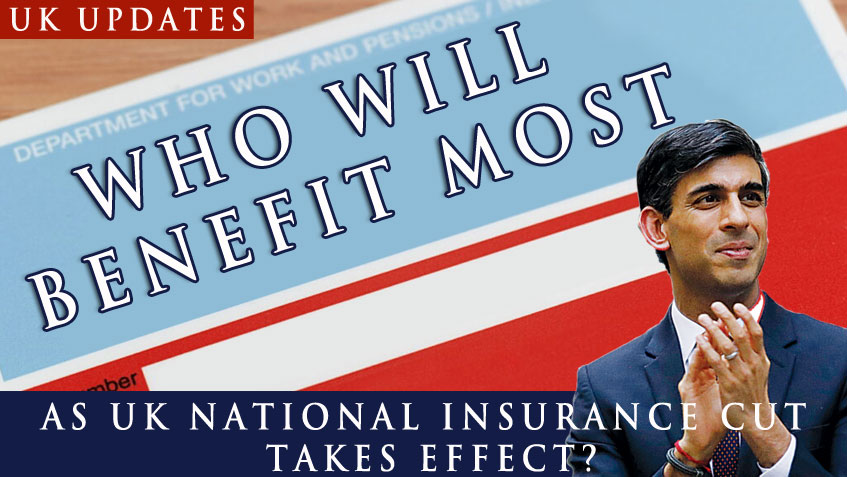When the UK national insurance cut goes into effect, who will gain the most?
Important queries addressed as the primary rate of employee-paid national insurance contributions is reduced to 10%

According to the government, a multibillion-pound tax cut has gone into effect, with 27 million UK workers expected to benefit.
There are cautions, though, indicating that millions of people will still wind up worse off this year even with the national insurance cut that takes effect on Saturday. Here, we examine the changes and their potential implications for you.
What’s taking place?
Starting on January 6, the government will reduce the primary national insurance contribution (NIC) rate that employees must pay from 12% to 10%. Jeremy Hunt, the chancellor, made this announcement in November’s autumn statement.
Contributions under “class 1” are made on earnings for individuals between 16 and state pension age who receive more than £242 per week from a single job. They are your responsibility to pay, and your employer will automatically deduct them.
10% of weekly earnings between £242 and £967 will now be paid by employees. They withhold 2% of any income exceeding £967 per week, or £50,284 annually. According to the Treasury, this is “the largest ever cut to national insurance,” with benefits expected to reach 27 million workers.
In pounds, what does it mean?
According to the Treasury, a worker earning £35,400 on average would benefit from the reduction by £450 annually.
According to the report, the changes will result in an annual gain of more than £520 for an average full-time nurse earning £38,900 and an additional £630 for an average teacher earning £44,300.
For what purposes is national insurance available?
Employers contribute to employee NICs, and employees pay income tax and NICs on their wages.
Massive amounts of money are raised for the Treasury coffers through NICs, which are then used to pay for state pensions, new-style jobseeker’s allowance, maternity allowance, and other benefits.
And those who work for themselves?
A tax cut will also help about 2 million self-employed people. If you work for yourself and earn £12,570 or more annually, you typically have to pay “class 2” and “class 4” national insurance contributions.
The main rate of class 4 self-employed NICs, which are paid on profits between £12,570 and £50,270, will be reduced by the government from 9% to 8% as of April 6 of this year. Moreover, class 2 self-employed NICs are being eliminated. They now cost £3.45 per week.
According to the Treasury, when these measures are combined, a self-employed individual earning £28,200 annually on average will save £350 in 2024–2025. It continues, a normal self-employed plumber earning £34,400 will benefit £410 from these cuts.
It follows that I will benefit more, won’t it?
Both yes and no. Many observers have stated that because the personal income tax thresholds have been announced to be frozen until 2028, the government is giving in some cases while taking back much more in others.
This will eventually force an increasing number of low-income households to pay the basic rate of tax, which starts at £12,570 annually, and those whose earnings are close to £50,000 to pay the higher 40% rate, which starts at £50,270. As a result, the Treasury will raise billions of dollars. Many critics refer to this phenomenon as “fiscal drag” or a “stealth tax.”
A worker on an average salary will only be £2.68 a week better off than they would have been had the tax thresholds not been frozen, according to wealth management firm Quilter, despite the NICs cut.
A few days ago, the think tank Resolution Foundation stated that when income tax bills increase in April, the lowest 50% of earners would forfeit any gains from the reduction of national insurance payments.
It stated that all employees making less than £26,000 a year would either benefit or be worse off overall, while those making more than that would benefit. It stated, “You’re in the sweet spot and will benefit most if you earn £50,000.”
Are employers prepared for this at all?
We’ll find out shortly. Employers are “facing a race against time” to update their payroll systems by the deadline, according to accounting firm RSM.
Many important employees would have been on vacation over the holidays and new year, and the changes were only announced on November 22.
RSM stated that HM Revenue and Customs would force employers to rerun their payroll retroactively for previous periods where higher NICs had been applied incorrectly if they could not update their software by Saturday.
Therefore, in order to request any refunds, employees should first get in touch with their employer. All of this suggests that in January and February, employers should expect a rise in employee inquiries,” the report stated.
For more related ukvi Articles: https://destinydot.com/news-portal/
WHATSAPP CHANNEL -The London Daily Channel is a place where you can learn about different things in the UK, such as education, how people live, staying healthy, finding work, and job openings. The posts will be useful for people who have recently arrived in the UK, such as students, job seekers, or tourists. Join With Us: https://whatsapp.com/channel/0029Va4bIhd6GcGCVFJLgE2L
